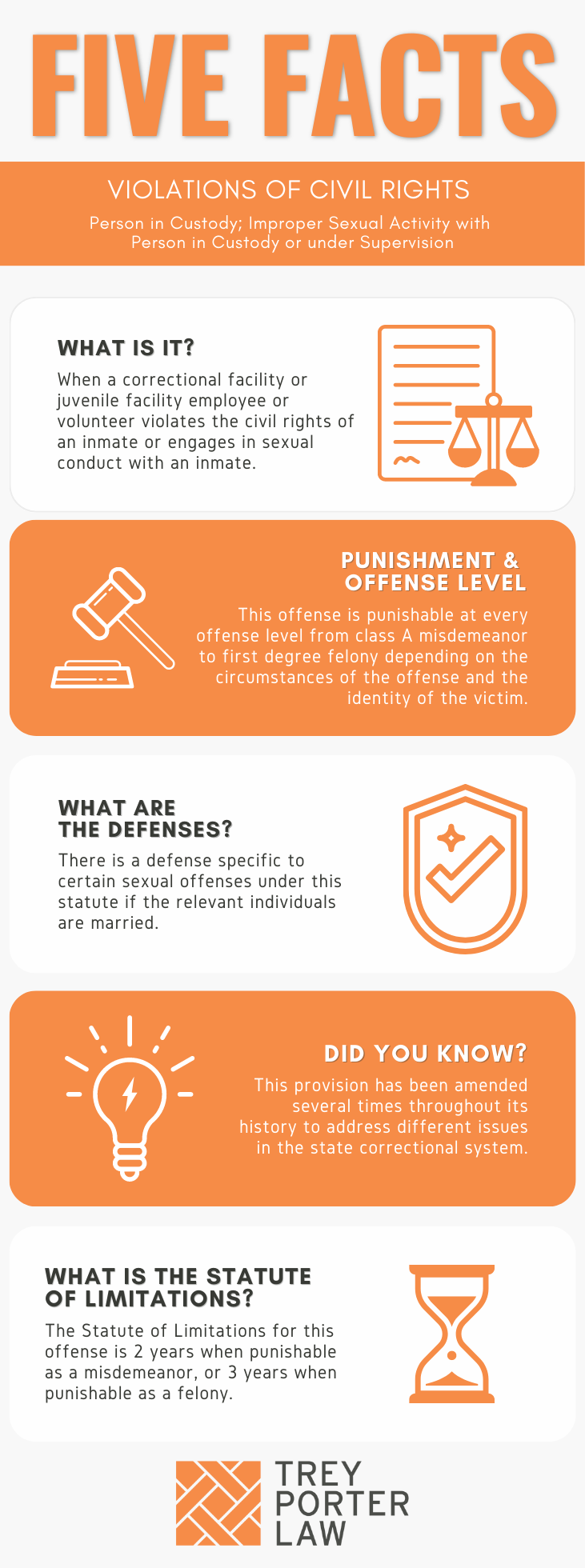WHAT IS VIOLATION OF THE CIVIL RIGHTS OF PERSON IN CUSTODY; IMPROPER SEXUAL ACTIVITY WITH PERSON IN CUSTODY OR UNDER SUPERVISION IN TEXAS?
Texas law prohibits anyone employed by or volunteering in a correctional facility or juvenile facility from violating a person’s civil rights while in custody, or engaging in sexual conduct with a person in custody or under supervision.
WHAT IS THE VIOLATION OF THE CIVIL RIGHTS OF PERSON IN CUSTODY; IMPROPER SEXUAL ACTIVITY WITH PERSON IN CUSTODY OR UNDER SUPERVISION LAW IN TEXAS?
Tex. Penal Code § 39.04. VIOLATION OF THE CIVIL RIGHTS OF PERSON IN CUSTODY; IMPROPER SEXUAL ACTIVITY WITH PERSON IN CUSTODY OR UNDER SUPERVISION.
(a) An official of a correctional facility or juvenile facility, an employee of a correctional facility or juvenile facility, a person other than an employee who works for compensation at a correctional facility or juvenile facility, a volunteer at a correctional facility or juvenile facility, or a peace officer commits an offense if the person intentionally:
(1) denies or impedes a person in custody in the exercise or enjoyment of any right, privilege, or immunity knowing his conduct is unlawful; or
(2) engages in sexual contact, sexual intercourse, or deviate sexual intercourse with an individual in custody or, in the case of an individual in the custody of the Texas Juvenile Justice Department or placed in a juvenile facility, employs, authorizes, or induces the individual to engage in sexual conduct or a sexual performance.
<Text of (b), as amended by Acts 2021, 87th Leg., ch. 895 (H.B. 3157), § 1>
(b) An offense under Subsection (a)(1) is a felony of the third degree . An offense under Subsection (a)(2) is a felony of the second degree, except that an offense under Subsection (a)(2) is a felony of the first degree if the offense is committed against:
(1) an individual in the custody of the Texas Juvenile Justice Department or placed in a juvenile facility; or
(2) a juvenile offender detained in or committed to a correctional facility.
<Text of (b), as amended by Acts 2021, 87th Leg., ch. 939 (S.B. 312), § 1>
(b) An offense under Subsection (a)(1) is a Class A misdemeanor. An offense under Subsection (a)(2) is a felony of the second degree .
(c) This section shall not preclude prosecution for any other offense set out in this code.
(d) The Attorney General of Texas shall have concurrent jurisdiction with law enforcement agencies to investigate violations of this statute involving serious bodily injury or death.
. . .
(f) An employee of the Texas Department of Criminal Justice, the Texas Juvenile Justice Department, a juvenile facility, a local juvenile probation department, or a community supervision and corrections department established under Chapter 76, Government Code, a person other than an employee who works for compensation at a juvenile facility or local juvenile probation department, or a volunteer at a juvenile facility or local juvenile probation department commits an offense if the actor engages in sexual contact, sexual intercourse, or deviate sexual intercourse with an individual who the actor knows is under the supervision of the Texas Department of Criminal Justice, Texas Juvenile Justice Department, probation department, or community supervision and corrections department but not in the custody of the Texas Department of Criminal Justice, Texas Juvenile Justice Department, probation department, or community supervision and corrections department.
(g) An offense under Subsection (f) is a state jail felony.
(h) It is an affirmative defense to prosecution under Subsection (f) that the actor was the spouse of the individual at the time of the offense.
WHAT IS THE PENALTY CLASS FOR VIOLATION OF THE CIVIL RIGHTS OF PERSON IN CUSTODY; IMPROPER SEXUAL ACTIVITY WITH PERSON IN CUSTODY OR UNDER SUPERVISION IN TEXAS?
The House and Senate enacted conflicting laws enhancing the penalty classification for this offense. Because HB 3157 was enacted one day after SB 312, HB 3157 would prevail. The penalty classifications further depend on the severity of the conduct of the person working or volunteering at a correctional facility or juvenile facility.
- First degree felony, punishable by five to 99 years or life in prison (or second degree felony under SB 312):
- If the person employs, authorizes, or induces a juvenile inmate to engage in sexual conduct or sexual performance.
- Second degree felony, punishable by two to 20 years in prison (under both bills):
- If the person engages in sexual contact, intercourse, or deviate sexual intercourse with an inmate;
- Third degree felony, punishable by two to ten years in prison (or Class A misdemeanor under SB 312, punishable by up to one year in jail):
- If the person knowingly denies or impedes an inmate’s exercise or enjoyment of a right, privilege, or immunity;
- State jail felony, punishable by 180 days to two years in a state jail facility (under both bills):
- If a person employed by a correctional facility, juvenile facility, or the probation department engages in sexual contact, intercourse, or deviate sexual intercourse with a person on probation, deferred, or parole.
WHAT IS THE PUNISHMENT RANGE FOR VIOLATION OF THE CIVIL RIGHTS OF PERSON IN CUSTODY; IMPROPER SEXUAL ACTIVITY WITH PERSON IN CUSTODY OR UNDER SUPERVISION IN TEXAS?
The punishment range for violating the civil rights of a person in custody, or improper sexual activity with a person in custody, depends on the penalty classification:
- Class A misdemeanor: possible jail sentence of up to one year, maximum fine of $4,000;
- Senate Bill 312 makes denying or impeding an inmate’s rights, privileges, and immunities a Class A misdemeanor, but HB makes it a third degree felony.
- State jail felony: 180 days to two years in a state jail facility, maximum fine of $10,000;
- If a correctional or juvenile facility employee or volunteer, or a supervision officer, engages in sexual activity with a person on probation, deferred adjudication, or parole, it is punishable as a state jail felony.
- Third degree felony: two to ten years in prison, maximum fine of $10,000;
- HB 3157 makes denying or impeding an inmate’s rights, privileges, or immunities a third degree felony, and pursuant to statutory construction rules in Texas Government Code 311.025(b), HB 3157 controls, rather than SB 312.
- Second degree felony: two to 20 years in prison, maximum fine of $10,000;
- Both bills punish engaging in sexual activity with a person in custody as a second degree felony. SB 312, the irreconcilable, non-controlling amendment, also punishes employing or authorizing sexual conduct or performance of a juvenile in custody, which HB 3157 punishes as a first degree felony.
- First degree felony: five to 99 years or life in prison, maximum fine of $10,000;
- HB 3157 makes it a first degree felony for an employee or volunteer at a correctional or juvenile facility to employ, authorize, or induce a juvenile inmate to engage in sexual conduct or sexual performance.
WHAT ARE THE PENALTIES FOR VIOLATION OF THE CIVIL RIGHTS OF PERSON IN CUSTODY; IMPROPER SEXUAL ACTIVITY WITH PERSON IN CUSTODY OR UNDER SUPERVISION IN TEXAS?
A person charged with violating civil rights of a person in custody, or improper sexual activity with a person in custody may be eligible for probation after a conviction, or deferred adjudication without a conviction. The minimum and maximum periods of supervision are:
- Class A misdemeanor: maximum period of two years;
- State jail felony: between two and five years, with the possibility of extending supervision for up to ten years;
- Third degree and second degree felonies: between two and ten years;
- First degree felony: between five and ten years.
WHAT ARE THE DEFENSES TO VIOLATION OF THE CIVIL RIGHTS OF PERSON IN CUSTODY; IMPROPER SEXUAL ACTIVITY WITH PERSON IN CUSTODY OR UNDER SUPERVISION IN TEXAS?
If a supervision officer or correctional facility employee or volunteer engages in sexual activity with anyone on probation, deferred adjudication, or parole, the statute authorizes an affirmative defense if they were spouses.
WHAT IS THE STATUTE OF LIMITATIONS FOR VIOLATION OF THE CIVIL RIGHTS OF PERSON IN CUSTODY; IMPROPER SEXUAL ACTIVITY WITH PERSON IN CUSTODY OR UNDER SUPERVISION IN TEXAS?
The limitation period for violation of the civil rights of a person in custody categorized as a felony is three years. If the offense is a Class A misdemeanor, the limitation period is two years.
VIOLATION OF THE CIVIL RIGHTS OF PERSON IN CUSTODY; IMPROPER SEXUAL ACTIVITY WITH PERSON IN CUSTODY OR UNDER SUPERVISION IN TEXAS
Persons working or volunteering in a correctional facility or juvenile facility may not engage in sexual conduct with anyone who is in custody or under supervision, nor may employees or volunteers deny inmates or detainees any right, privilege, or immunity.
TEXAS VIOLATION OF THE CIVIL RIGHTS OF PERSON IN CUSTODY; IMPROPER SEXUAL ACTIVITY WITH PERSON IN CUSTODY OR UNDER SUPERVISION COURT CASES
The case law regarding violation of the civil rights of a person in custody, or improper sexual activity with a person in custody or under supervision in Texas illustrates the statute’s application.
- In Irielle v. State, the defendant was a prison guard, and the victim was an inmate. The defendant began going to the victim’s cubicle at night and masturbating in front of the victim. He later forced the victim to perform oral sex, and threatened to tell other prisoners the victim was convicted of sexually assaulting a child. The victim eventually told another guard about the defendant’s conduct, and the defendant was convicted of improper sexual activity. The appellate court affirmed.













